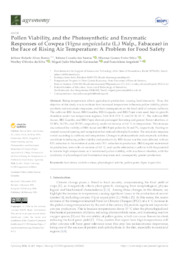Pollen viability, and the photosynthetic and enzymatic responses of cowpea (Vigna unguiculata (L.) Walp., Fabaceae) in the face of rising air temperature: a problem for food safety.
Pollen viability, and the photosynthetic and enzymatic responses of cowpea (Vigna unguiculata (L.) Walp., Fabaceae) in the face of rising air temperature: a problem for food safety.
Resumo: Rising temperature affects agricultural production, causing food insecurity. Thus, the objective of this study was to evaluate how increased temperature influences pollen viability, photosynthetic and enzymatic responses, and their consequences on the final yield of cowpea cultivars. The cultivars BRS Acauã, BRS Guariba, BRS Gurguéia, and BRS Pajeú were used, kept in growth chambers under two temperature regimes: 24.8–30.8–37.8 ?C and 20–26–33 ?C. The cultivars BRS Acauã, BRS Guariba, and BRS Pajeú showed prolonged flowering and greater flower abortion, at 23.58%, 34.71%, and 25.55%, respectively, under an increase of 4.8 ?C in temperature. This increase also reduced the viability of BRS Acauã and BRS Pajeú pollen by 34 and 7%, respectively. Heating increased stomatal opening and transpiration but reduced chlorophyll content. The enzymatic response varied according to cultivars and temperature. Changes in photosynthetic and enzymatic activities contribute to reducing pollen viability and productivity. BRS Acauã was the most affected, with an 82% reduction in the number of seeds and a 70% reduction in production. BRS Gurguéia maintained its production, even with an increase of 4.8 ?C, and can be selected as a cultivar with the potential to tolerate high temperatures as it maintained pollen viability, with less flower abortion, with the synchrony of physiological and biochemical responses and, consequently, greater production.
Ano de publicação: 2024
Tipo de publicação: Artigo de periódico
Unidade: Embrapa Semiárido
Observações
1 - Por padrão são exibidas publicações dos últimos 20 anos. Para encontrar publicações mais antigas, configure o filtro ano de publicação, colocando o ano a partir do qual você deseja encontrar publicações. O filtro está na coluna da esquerda na busca acima.
2 - Para ler algumas publicações da Embrapa (apenas as que estão em formato ePub), é necessário ter, no celular ou computador, um desses softwares gratuitos. Sistemas Android: Google Play Livros; IOS: iBooks; Windows e Linux: software Calibre.
Acesse outras publicações
Acesse a Base de Dados da Pesquisa Agropecuária (BDPA) para consultar o acervo completo das bibliotecas da Embrapa.

